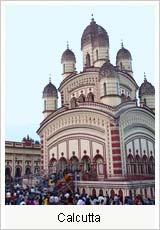Introduction:
Kolkata or Calcutta is the self-proclaimed capital of India's
intellectuals, home to three Nobel Prize laureates (including
the revered Rabindranath Tagore, who became Asia's first Nobel
laureate in 1913) and an Oscar-winning film director (Satyajit
Ray). Warm, helpful, and imbued with a great sense of humor
(not to mention a famously keen appreciation for dining),
the Bengalis live by the maxim that "what Bengal does
today, India will do tomorrow." Engaging in lively discussion
on the benefits or drawbacks of Communism, or on the original
recipe for sandesh (milk-based sweets, a Bengali specialty),
is likely to be one of your more memorable experiences in
India.
Sightseeing:
Maidan and Fort William
Maidan and Fort William situated near the river Hooghly, this
is one of the biggest parks in India. It covers an area of
3 km². On the west of Maidan, is Fort William. Fort William
the most impressive edifice in Kolkata of the military power
of the British Raj in the East. It continues to serve as a
citadel of the Indian army in Eastern India. Actually, there
were two Fort Williams, the old and the new.
Eden Garden
Eden Garden of Kolkata was established in 1864. It is considered
one of the oldest and finest grounds in the world. Eden Garden
provides the largest cricketing facilities in the world. It
has a seating capacity of 120,000 persons.
Victoria Memorial
The credit for designing and drawing the plan for this monument
goes to Sir William Emerson, President of the British Institute
of Architects. Victoria Memorial of Kolkata, India is a fantastic
place that will take you into the world of past history, where
you can view the photos and effigies of prominent personalities,
who made an incredible contribution in the glory of India.
Today, Victoria memorial is one of the finest art museums
in Kolkata. It is a 184 ft tall edifice that was constructed
on 64 acres of land. The museum houses a group of mind-blowing
figures above the north porch that epitomize prudence, learning
and motherhood.
Saint Paulís Cathedral
Calcutta St. Paul's Cathedral is the first Episcopal Church
of the Orient. Bishop Wilson patronized the construction of
this beautiful church in 1839. The church is located within
huge grounds, where you can also find a meditation point that
has been set up in the recent times in collaboration with
distinguished citizens of Tagore's Shantiniketan. The beautiful
pictures describe the life and works of Saint Paul. The atmosphere
of this cathedral is very tranquil. The architecture and the
interim of the Saint Paul Cathedral is truly a feast for eyes.
Nakhoda Mosque
The Nakhoda Mosque, Kolkata, located in Jacquaria Street,
near the junction of Chitpore Road and Mahatma Gandhi Road
was founded by Abdar Rahim Osman, a resident of Cutch in 1926.
The massive red sandstone mosque was constructed on the lines
of Akbar's tomb in Sikandra, Agra. The magnificent dome shaped
mosque made of red sandstone has two minarets, each about
151ft. high and 25 tiny pillars all around, which are 100ft.
- 117ft. tall. The finest specimen of the Indo-Saracenic school
of architecture, the Nakhoda Mosque, Kolkata, is an outstanding
exhibition of superb embellishment and artistic extravaganza.
Paresnath Jain Temple (Buily by Sh.
Ray Badridas Bahadur)
Pareshnath Jain temple is a very famous temple of Calcutta
that was built by an art connoisseur named Ray Badridas Bahadur
in 1867. Located in the northeast side of the city, Calcutta
Pareshnath Jain temple is a mind-blowing place of worship,
the beauty of which is enhanced by mirrors and colored stones.
It houses four different temples, out of which the main temple
is established in the honor of the 10th Jain Avtaar, Sri Sital
Nath Ji. There is a small stream over there, which is covered
by gorgeous flowers on all sides. Pareshnath Jain temple of
Kolkata also contains a cozy greeting room and a museum.
Kali Temple
Kalighat is located in the city of Calcutta on the banks of
the river Hooghly (Bhagirathi). The name Calcutta is said
to have been derived from the word Kalighat. The Kalighat
temple in its present form is only about 200 years old, although
it has been referred to in Mansar Bhasan composed in the 15th
century, and in Kavi Kankan Chandi of the 17th century.
|
|
 |

